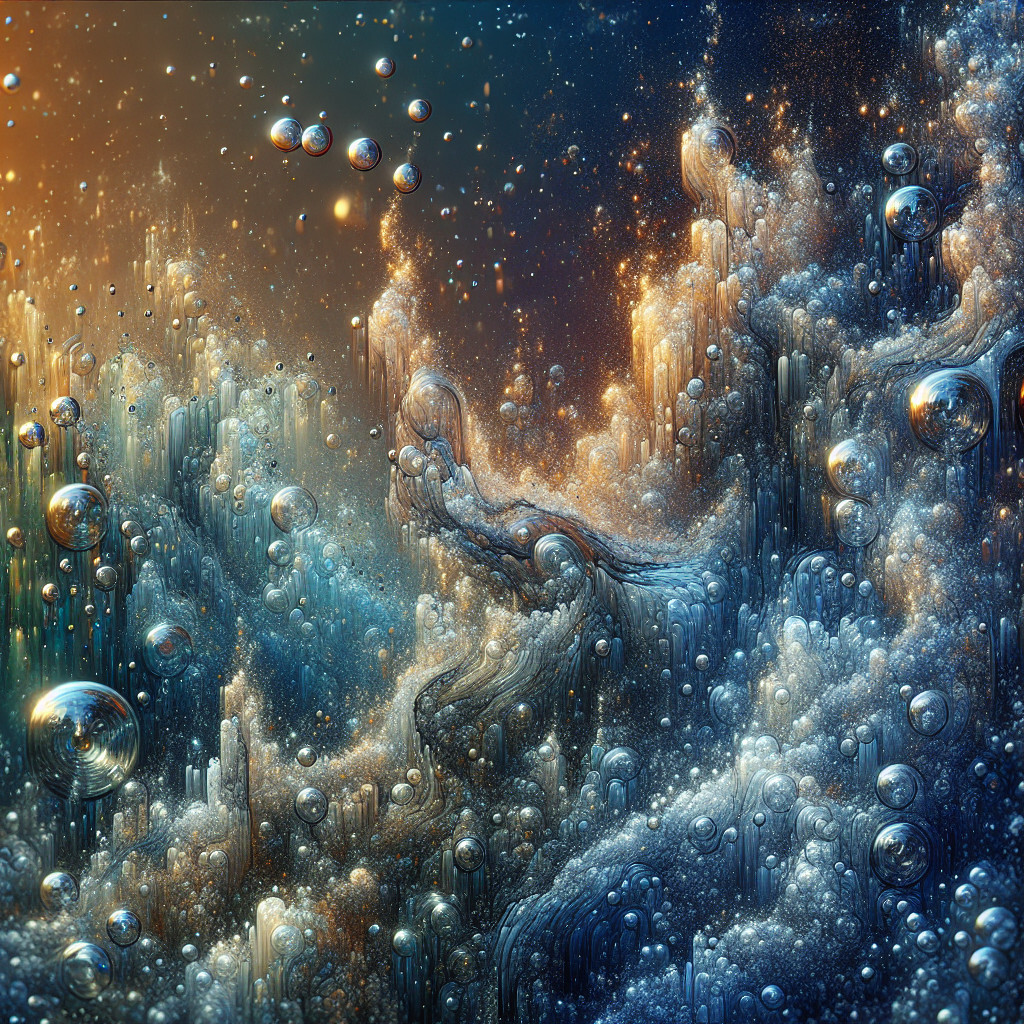-
Table of Contents
“Mineral Water: Naturally Sparkling, Refreshingly Pure”
Introduction

Mineral water and sparkling water are both types of bottled water available in the market. Mineral water is water from a mineral spring that contains various minerals, such as salts and sulfur compounds. It is often effervescent due to the presence of gases. On the other hand, sparkling water, also known as carbonated water or soda water, is water into which carbon dioxide gas under pressure has been dissolved, a process that causes the water to become effervescent. It can be natural or created by man by adding carbon dioxide under pressure. Both types of water can be consumed directly from the bottle and are often used as a base for non-alcoholic beverages.
Exploring the Health Benefits of Sparkling Mineral Water
Mineral water and sparkling water are often used interchangeably in casual conversation, leading to a common misconception that they are one and the same. However, while they share certain similarities, they are distinct in their composition and health benefits. This article aims to explore the health benefits of sparkling mineral water, a beverage that combines the best of both worlds.
Sparkling mineral water is a type of carbonated water that naturally contains minerals and salts. Unlike regular sparkling water, which is often artificially carbonated and may not contain any minerals, sparkling mineral water is sourced from a mineral spring. The carbonation can either be naturally occurring, due to the geological activity at the source, or added later during the bottling process.
One of the primary health benefits of sparkling mineral water is its rich mineral content. It contains essential minerals like calcium, magnesium, and potassium, which are vital for various bodily functions. Calcium is crucial for bone health, magnesium plays a key role in nerve and muscle function, and potassium helps regulate fluid balance and blood pressure. Regular consumption of sparkling mineral water can contribute to your daily mineral intake, promoting overall health.
Another significant benefit of sparkling mineral water is its potential to aid digestion. The carbonation in the water can stimulate the production of stomach acid and enzymes, which can help break down food more efficiently. This can alleviate symptoms of indigestion and improve overall digestive health. Moreover, the bubbles in sparkling mineral water can create a feeling of fullness, which may help control appetite and support weight management.
Sparkling mineral water also has a hydrating effect similar to still water. Despite the common myth that carbonated water can dehydrate you, research has shown that it can hydrate you just as effectively as still water. This makes it a refreshing and beneficial choice for maintaining hydration, especially for those who struggle to consume enough plain water.
However, it’s important to note that not all sparkling mineral waters are created equal. Some brands may add sugar or artificial flavors, which can negate some of the health benefits. Therefore, it’s crucial to read the label and choose a brand that doesn’t contain added sugars or other unnecessary additives.
In conclusion, sparkling mineral water offers a range of health benefits, from providing essential minerals to aiding digestion and promoting hydration. It’s a refreshing alternative to plain water and can be a beneficial addition to a balanced diet. However, as with any beverage, it’s important to consume it in moderation and as part of a varied and balanced diet.
While sparkling mineral water is not the same as regular sparkling water, it combines the benefits of both mineral water and carbonated water, making it a unique and healthful beverage choice. So, the next time you reach for a refreshing drink, consider choosing sparkling mineral water for its potential health benefits.
The Science Behind Sparkling Mineral Water: How It’s Made
Mineral water and sparkling water are often used interchangeably in casual conversation, leading to a common misconception that they are one and the same. However, a deeper dive into the science behind these beverages reveals distinct differences in their composition and production processes.
Mineral water, as the name suggests, is water that naturally contains minerals. These minerals, such as calcium, magnesium, and potassium, are absorbed from the ground where the water is sourced. The World Health Organization (WHO) stipulates that for water to be classified as mineral water, it must contain a minimum of 250 parts per million total dissolved solids. These dissolved solids are the minerals and trace elements that give mineral water its characteristic taste and potential health benefits.
On the other hand, sparkling water, also known as carbonated water, is water into which carbon dioxide gas has been dissolved under pressure. This process results in the effervescent bubbles that give sparkling water its fizz. The carbonation process can be natural or artificial. Naturally carbonated water is sourced from springs or wells where the water is naturally infused with carbon dioxide gas. Artificially carbonated water, however, is created by dissolving carbon dioxide gas into still water under high pressure.
Now, where does sparkling mineral water fit into this picture? Sparkling mineral water is essentially mineral water that has been carbonated. It combines the mineral-rich properties of mineral water with the effervescence of sparkling water. This can occur naturally at the source, where the water absorbs both minerals from the ground and carbon dioxide gas, or it can be artificially produced by adding carbon dioxide to still mineral water.
The production process of sparkling mineral water is a fascinating blend of nature and science. In the case of naturally occurring sparkling mineral water, the water is sourced from underground reservoirs or springs. As it travels through layers of rock, it absorbs various minerals. Simultaneously, it may also absorb naturally occurring carbon dioxide gas, resulting in a naturally effervescent mineral water.
For artificially produced sparkling mineral water, the process is slightly more complex. The mineral water is first sourced, ensuring it meets the WHO’s criteria for mineral content. It is then filtered to remove any impurities while retaining the beneficial minerals. Once the water is purified, carbon dioxide gas is added under high pressure. This process, known as carbonation, infuses the water with bubbles, creating the characteristic fizz of sparkling water.
In conclusion, while mineral water and sparkling water are distinct in their composition and production, they can be combined to create sparkling mineral water. This beverage offers the potential health benefits of mineral water, such as a source of essential minerals, coupled with the refreshing fizz of sparkling water. Whether naturally occurring or artificially produced, the science behind sparkling mineral water is a testament to the fascinating interplay between nature and technology in our everyday lives.
Comparing Still and Sparkling Mineral Water: What’s the Difference?
Mineral water, a popular choice among health-conscious individuals, is often categorized into two types: still and sparkling. While both types originate from a natural mineral spring, they exhibit distinct characteristics that set them apart. This article aims to provide a comprehensive comparison between still and sparkling mineral water, highlighting their differences and similarities.
Still mineral water, as the name suggests, is calm and devoid of any effervescence. It is extracted directly from the source and bottled without any additional treatment, preserving its natural mineral content. The minerals found in still water, such as calcium, magnesium, and potassium, are essential for the human body’s proper functioning. These minerals contribute to bone health, aid in digestion, and help maintain heart health, among other benefits. The taste of still mineral water is often described as fresh and clean, with subtle variations depending on the specific mineral composition.
On the other hand, sparkling mineral water, also known as carbonated mineral water, is characterized by its fizziness. This effervescence is a result of the natural presence of carbon dioxide gas, which can occur naturally at the source or be added during the bottling process. Like its still counterpart, sparkling mineral water also contains beneficial minerals. However, the presence of carbonation can significantly alter the taste, often described as slightly acidic or tangy, which many people find refreshing.
Despite these differences, both still and sparkling mineral water share a common origin and offer similar health benefits. They are both free from added sugars, artificial flavors, and preservatives, making them a healthier alternative to sugary soft drinks. Moreover, they both provide hydration and replenish the body’s mineral content.
However, the choice between still and sparkling mineral water often boils down to personal preference. Some people prefer the crisp, refreshing taste of sparkling water, while others find the effervescence off-putting and opt for the smoothness of still water. Additionally, some individuals may find that sparkling water aids in digestion and provides a feeling of fullness, making it a popular choice for those trying to control their appetite.
It’s also worth noting that while both types of mineral water are generally safe for consumption, excessive intake of sparkling water may lead to bloating and gas due to the carbonation. Furthermore, some studies suggest that the acidity in sparkling water could potentially harm tooth enamel if consumed in large quantities over time. However, the risk is significantly lower compared to sugary drinks and sodas.
In conclusion, while still and sparkling mineral water share a common source and offer similar health benefits, they differ in terms of taste and texture due to the presence or absence of carbonation. The choice between the two is largely a matter of personal preference. Regardless of the type you choose, mineral water is a healthy and refreshing beverage option that can contribute to your overall well-being.
The Role of Sparkling Mineral Water in Gourmet Cuisine
Mineral water and sparkling water are often used interchangeably in casual conversation, leading to a common misconception that they are one and the same. However, in the world of gourmet cuisine, the distinction between these two types of water is crucial. Sparkling mineral water, with its unique properties and characteristics, plays a significant role in the creation of culinary masterpieces.
Mineral water, as the name suggests, is water that naturally contains minerals. These minerals, such as calcium, magnesium, and potassium, are absorbed from the ground where the water is sourced. On the other hand, sparkling water, also known as carbonated water, is water into which carbon dioxide gas has been dissolved under pressure. This process gives the water its characteristic effervescence or ‘sparkle’. When these two concepts intersect, we get sparkling mineral water, a beverage that combines the health benefits of mineral water with the refreshing fizziness of sparkling water.
In gourmet cuisine, sparkling mineral water is not just a palate cleanser or a thirst quencher. It is an ingredient that can elevate a dish from ordinary to extraordinary. The effervescence of sparkling mineral water can add a unique texture to a variety of dishes. For instance, when used in batter for fried foods, it can create a lighter, crispier crust. Similarly, it can be used in dough for bread or pastries to make them fluffier and more tender.
Moreover, the minerals present in sparkling mineral water can subtly enhance the flavor profile of a dish. Minerals like calcium and magnesium can interact with other ingredients in a recipe, subtly altering and enhancing their flavors. This is particularly beneficial in dishes where the delicate balance of flavors is paramount. For instance, in a seafood risotto, the addition of sparkling mineral water can help to accentuate the fresh, briny flavors of the seafood, while also adding a slight hint of complexity to the dish.
In addition to its role as an ingredient, sparkling mineral water is also a popular choice for pairing with gourmet meals. The bubbles in the water can help to cleanse the palate between courses, allowing the diner to fully appreciate the flavors of each dish. Furthermore, the minerals in the water can complement the flavors in the food, creating a harmonious dining experience.
However, it’s important to note that not all sparkling mineral waters are created equal. The mineral composition can vary greatly depending on the source of the water. Therefore, chefs and sommeliers often have preferred brands or sources of sparkling mineral water that they believe best complement their culinary creations.
In conclusion, while mineral water and sparkling water may seem similar to the untrained eye, their combination in the form of sparkling mineral water plays a significant role in gourmet cuisine. From enhancing the texture and flavor of dishes to complementing the dining experience, sparkling mineral water is a versatile and valuable tool in the culinary world. So, the next time you enjoy a gourmet meal, take a moment to appreciate the humble glass of sparkling mineral water at your side. It’s more than just a refreshing beverage; it’s a key player in the symphony of flavors that is gourmet cuisine.
Q&A
1. Question: Is mineral water the same as sparkling water?
Answer: No, mineral water and sparkling water are not the same. Mineral water contains minerals naturally, while sparkling water is carbonated by adding carbon dioxide.
2. Question: Can mineral water be sparkling?
Answer: Yes, mineral water can be sparkling if it naturally contains gas or if gas has been added to it.
3. Question: What are the health benefits of mineral water and sparkling water?
Answer: Both mineral water and sparkling water can keep you hydrated. Mineral water can also provide essential minerals like calcium and magnesium.
4. Question: Can you replace regular water with mineral or sparkling water?
Answer: Yes, you can replace regular water with mineral or sparkling water, but it’s important to note that some sparkling waters may contain added sugars or flavors.
Conclusion
In conclusion, mineral water and sparkling water are not exactly the same. While both may contain minerals and are often carbonated, the key difference lies in their source and processing. Mineral water comes from a naturally occurring mineral spring, and contains various minerals like salts and sulfur compounds. Sparkling water, on the other hand, is often regular water that has been carbonated artificially, and may not contain the same level of minerals.






